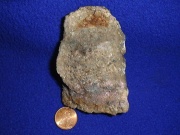Cobalt
Description
A hard, ductile metallic element. Cobalt was first identified by Georg Brandt of Sweden in 1735. It has an abundance of 0.001-0.002% in the earth's crust and is found in the minerals smaltite, cobaltite, chloanthite, linnaetite, and erythrite. Metallic cobalt is added to alloys to increase hardness at high temperatures. It is also Ferromagnetic. Cobalt oxides and salts are usually blue and they are used as pigments in paints, glass, and ceramic glazes.
Synonyms and Related Terms
Co; cobalto (It., Port., Esp.,); Kobolt (Ned., Sven.)
Risks
Flammable solid. May explode when heated. Fumes may cause irritation or illness. Dust is toxic by inhalation. Contact may cause irritation. Potential carcinogen.
Fisher Scientific: MSDS
Physical and Chemical Properties
Soluble in mineral acids and attacked slowly by alkalis.
| Composition | Co (atomic no. 27) |
|---|---|
| CAS | 7440-48-4 |
| Melting Point | 1493 |
| Density | 8.92 |
| Molecular Weight | atomic wt = 58.9332 |
| Boiling Point | about 3100 |
Resources and Citations
- Web Elements: Website
- G.S.Brady, Materials Handbook, McGraw-Hill Book Co., New York, 1971 Comment: p. 60
- Van Nostrand's Scientific Encyclopedia, Douglas M. Considine (ed.), Van Nostrand Reinhold, New York, 1976
- Random House, Webster's Encyclopedic Unabridged Dictionary of the English Language, Grammercy Book, New York, 1997
- The Merck Index, Martha Windholz (ed.), Merck Research Labs, Rahway NJ, 10th edition, 1983 Comment: entry 2488
- The American Heritage Dictionary or Encarta, via Microsoft Bookshelf 98, Microsoft Corp., 1998
